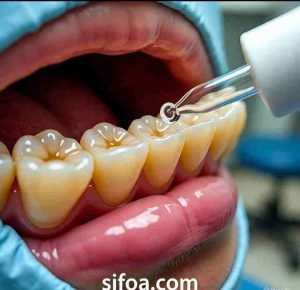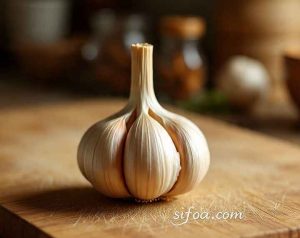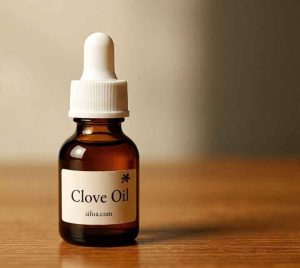Tooth Infections and the Role of Natural Remedies

What Is the Strongest Natural Antibiotic for Tooth Infection (Some Top Natural)
1. Garlic: Nature’s Potent Antibacterial Warrior

How to Use It:
- Crush a fresh garlic clove to release allicin and let it sit for 10 minutes.
- Apply the paste directly to the affected tooth or gum for 5-10 minutes, then rinse with warm water.
- For milder relief, chew a small piece of raw garlic near the sore area or add it into your diet.
Benefits:
Caution:
2. Clove Oil: A Time-Tested Pain Reliever and Antimicrobial

Clove oil which is derived from the clove plant (Syzygium aromaticum), contains eugenol, a compound with powerful antibacterial, antifungal, and numbing properties. Eugenol inhibits bacterial enzymes, making it effective against infection causing microbes. It’s a staple in dental practices for it’s ability to provide quick relief from toothache while combating the underlying issue.
How to Use It:
- Dilute 2-3 drops of clove oil with a carrier oil like coconut oil (1:1 ratio) to avoid irritation.
- Soak a cotton ball in the mixture and apply it to the infected area for 10-15 minutes.
- Repeat 2-3 times daily, but not for more than a few days.
Benefits:
Caution:
3. Turmeric: Anti-Inflammatory Filled

Turmeric (Curcuma longa) owes it’s strength to curcumin, an active ingredient with potent anti-inflammatory and antimicrobial effects. Curcumin disrupts bacterial biofilms and reduces oxidative stress in infected tissues, helping to alleviate swelling and promote healing. It is particularly useful for gum related infections.
How to Use It:
- Mix 1 teaspoon of turmeric powder with enough water to form a paste.
- Apply to the affected area and leave for 15-20 minutes before rinsing.
- For added benefits, add it to warm milk or tea for internal support.
Benefits:
Soothes inflammation, fights bacteria, and supports tissue repair. It is gentle and widely available as a spice.
Caution:
It may stain the teeth with a temporary yellow colour. Consult a doctor if you’re on blood-thinning medications.
4. Tea Tree Oil: A Broad-Spectrum Antiseptic
Tea tree oil (Melaleuca alternifolia) is a natural essential oil with terpinen-4-ol, which exhibits strong antibacterial and antifungal activity. It is effective against resistant oral bacteria and can help prevent infection progression.
How to Use It:
- Dilute 1-2 drops in a teaspoon of carrier oil or add to warm water for a rinse.
- Swish gently for 30 seconds, or apply topically with a cotton swab.
- Use 2-3 times daily.
Benefits:
Cleanses the mouth, reduces plaque, and eases gum tenderness.
Caution:
Never ingest undiluted; it can be toxic. Avoid if you’re pregnant or allergic to plants in the myrtle family.
5. Saltwater Rinse: A Simple, Effective Cleanser
Not an “antibiotic” per se, but a hypertonic saltwater solution draws out fluids from swollen tissues and creates an inhospitable environment for bacteria. It is one of the safest first-line remedies.
How to Use It:
- Dissolve 1/2 teaspoon of salt in a cup of warm water.
- Swish for 30-60 seconds, focusing on the infected area, several times a day.
Benefits:
Reduces pain and swelling quickly while flushing debris.
Caution:
Use sea salt or table salt; avoid if you have high blood pressure concerns.
Why Garlic Stands Out as the Strongest
While all these remedies are valuable, garlic’s allicin provides a more direct and potent punch against the anaerobic bacteria common in tooth abscesses. Traditional and anecdotal evidence, supported by lab studies, positions it ahead of others for its ability to penetrate biofilms and inhibit growth without needing dilution for basic use. However, combining remedies like garlic with a saltwater rinse can enhance results.
Important Precautions and When to Seek Professional Help
Natural remedies can offer symptomatic relief, but tooth infections rarely resolve without addressing the root cause. If left untreated, they can lead to serious issues like sepsis. Always:
- Dilute essential oils to prevent burns.
- Stop use if irritation occurs and rinse thoroughly.
- Avoid in children, pregnant individuals, or those with allergies without guidance.
See a dentist immediately if the pain persists beyond 1-2 days, worsens, or is accompanied by fever, difficulty swallowing, or spreading swelling. They may recommend antibiotics, a root canal, or extraction for complete resolution.
SEE ALSO:
The Best Way to Lose 15 Pounds: A Healthy and Sustainable Approach
Weight Loss Workout Plan for Sustainable Fitness
12 Tips to Reduce Sugar Intake Without Feeling Deprived
Prevention:
The best defense is daily oral hygiene: Brush twice daily with fluoride toothpaste, floss regularly, and use an antimicrobial mouthwash. Add garlic and turmeric into meals for ongoing antibacterial support. Limit sugary foods, stay hydrated, and schedule biannual dental check-ups. A healthy diet rich in vitamins C and D bolsters your immune system against oral threats. By using these natural antibiotics wisely, you can manage tooth infection discomfort holistically.